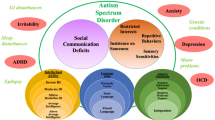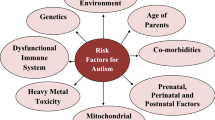Abstract
Current estimates from the Centers for Disease Control and Prevention (CDC) show that autism spectrum disorder (ASD) currently impacts approximately 1 in 59 children (CDC 2018). As many children are being diagnosed with ASD or receiving an educational identification of autism during preschool and school age years, school psychologists may be the initial point of contact for families when first assessing for and receiving school-based services for ASD and must have robust knowledge on this topic. However, there is currently limited information regarding ASD knowledge among school psychologists, particularly school psychology graduate students. School psychology graduate students were given the Autism Spectrum Knowledge Scale Professional Version (ASKSP) to obtain measured ASD knowledge and were asked about their self-perceived ASD knowledge and clinical skill competencies with children and families with ASD. The results demonstrate that in general, graduate students have many self-perceived limitations regarding ASD knowledge and competencies. Although there is a positive trend towards obtaining more knowledge and self-perceived competencies over the course of the graduate program, there are multiple areas where increased training and professional development is needed. This study also demonstrates the potential utility of the ASKSP in future research and training environments.



Similar content being viewed by others
References
Aiello, R., Ruble, L., & Esler, A. (2017). National study of school psychologists’ use of evidence-based assessment in autism spectrum disorder. Journal of Applied School Psychology, 33(1), 67–88. https://doi.org/10.1080/15377903.2016.1236307.
American Psychiatric Association. (2013). Diagnostic and statistical manual of mental disorders (5th ed.). Washington, DC: Author.
American Psychological Association: Task Force on Evidence-Based Practice with Children and Adolescents. (2008). Disseminating evidence-based practice for children and adolescents: a systems approach to enhancing care. Washington, DC: Author.
Barned, N. E., Knapp, N. F., & Neuharth-Pritchett, S. (2011). Knowledge and attitudes of early childhood preservice teachers regarding the inclusion of children with autism spectrum disorder. Journal of Early Childhood Teacher Education, 32(4), 302–321. https://doi.org/10.1080/10901027.2011.622235.
Bond, C., Symes, W., Hebron, J., Humphrey, N., Morewood, G., & Woods, K. (2016). Educational interventions for children with ASD: a systematic literature review 2008-2013. School Psychology International, 37(3), 303–320. https://doi.org/10.1177/0143034316639638.
Campbell, J. M., Ruble, L. A., & Hammond, R. K. (2014). Comprehensive developmental assessment model. In L. A. Wilkinson (Ed.), Autism spectrum disorder in children and adolescents: evidence-based assessment and intervention in schools. Washington, DC: American Psychological Association.
Centers for Disease Control and Prevention. (2018). Data and statistics on autism spectrum disorder. Retrieved from https://www.cdc.gov/ncbddd/autism/data.html.
Clark, M. L. E., Vinen, Z., Barbaro, J., & Dissanayake, C. (2017). School age outcomes of children diagnosed early and later with autism spectrum disorder. Journal of Autism and Developmental Disorders, 1–11. https://doi.org/10.1007/s10803-017-3279-x.
Corkum, P., Bryson, S. E., Smith, I. M., Giffin, C., & Hume, K. (2014). Professional development needs for educators working with children with autism spectrum disorders in inclusive school environments. Exceptionality Education International, 24(1), 33–47.
Corona, L. L., Christodulu, K. V., & Rinaldi, M. L. (2017). Investigation of school professionals’ self-efficacy for working with students with ASD: impact of prior experience, knowledge, and training. Journal of Positive Behavior Interventions, 19(2), 90–101. https://doi.org/10.1177/1098300716667604.
Harris, P. A., Taylor, R., Thielke, R., Payne, J., Gonzalez, N., & Conde, J. G. (2009). Research electronic data capture (REDCap): a metadata-driven methodology and workflow process for providing translational research informatics support. Journal of Biomedical Informatics, 42(2), 377–381. https://doi.org/10.1016/j.jbi.2008.08.010.
Koegel, L., Matos-Freden, R., Lang, R., & Koegel, R. (2012). Interventions for children with autism spectrum disorders in inclusive school settings. Cognitive and Behavioral Practice, 19(3), 401–412. https://doi.org/10.1016/j.cbpra.2010.11.003.
McClain, M.B., Harris, B., Schwartz, S. E., Haverkamp, C. R., & Golson, M. E. (2019). Development and validation of the Autism spectrum Knowledge Scale – Professional Version: Preliminary Analyses. https://doi.org/10.17605/OSF.IO/8M9UB.
McCrimmon, A. W., & Yule, A. E. (2017). Clinical reasoning in the assessment and planning for intervention for autism spectrum disorder. Canadian Journal of School Psychology, 32(1), 59–72. https://doi.org/10.1177/0829573516658564.
National Association of School Psychologists. (2010). Standards for graduate preparation of school psychologists. Bethesda: Author.
National Association of School Psychologists. (2016). School psychologists’ involvement in assessment. Bethesda: Author.
Olley, J. G., & Rosenthal, S. L. (1985). Current issues in school services for students with autism. School Psychology Review, 14(2), 166–170.
Ruble, L. A., & Akshoomoff, N. (2010). Autism spectrum disorders: identification and diagnosis. Communique, 38(8), 1–4.
Schwartz, H., & Drager, K. D. (2008). Training and knowledge in autism among speech-language pathologists: a survey. Language, Speech, and Hearing Services in Schools, 39(1), 66–77. https://doi.org/10.1044/0161-1461(2008/007).
Segall, M. J., & Campbell, J. M. (2012). Factors relating to education professionals’ classroom practices for the inclusion of students with autism spectrum disorders. Research in Autism Spectrum Disorders, 6(3), 1156–1167. https://doi.org/10.1016/j.rasd.2012.02.007.
Stone, W. L. (1987). Cross-disciplinary perspectives on autism. Journal of Pediatric Psychology, 12(4), 615–630. https://doi.org/10.1093/jpepsy/12.4.615.
Tucker, V., & Schwartz, I. (2013). Parents’ perspectives of collaboration with school professionals: barriers and facilitators to successful partnerships in planning for students with ASD. School Mental Health, 5(1), 3–14. https://doi.org/10.1007/s12310-012-9102-0.
U.S. Department of Education, National Center for Education Statistics. (2016). Children and youth with disabilities. Retrieved from https://nces.ed.gov/programs/coe/indicator_cgg.asp.
Wilkinson, L. A. (2013). School psychologists need more training in providing services to students with autism spectrum disorders (ASD). Autism, 3(2), 1–2. https://doi.org/10.4172/2165-7890.1000e117.
Wilkinson, L. A. (2014). Introduction: evidence-based practice for autism spectrum disorder. In L. A. Wilkinson (Ed.), Autism spectrum disorder in children and adolescents: evidence-based assessment and intervention in schools (pp. 3–13). Washington, DC: American Psychological Association.
Williams, K. L., Schroeder, J. L., Carvalho, C., & Cervantes, A. (2011). School personnel knowledge of autism: a pilot survey. The School Psychologist, 65(2), 7–14.
Author information
Authors and Affiliations
Corresponding author
Ethics declarations
Conflict of Interest
The authors declare that there is no conflict of interest.
Ethical Approval Statement
Institutional review and approval of this study was completed by a University Institutional Review Board (name removed for anonymity).
Informed Consent
All participants provided informed consent (per the University IRB-approved process).
Additional information
Publisher’s Note
Springer Nature remains neutral with regard to jurisdictional claims in published maps and institutional affiliations.
Rights and permissions
About this article
Cite this article
Harris, B., McClain, M.B., Schwartz, S. et al. Knowledge of Autism Spectrum Disorder Among School Psychology Graduate Students. Contemp School Psychol 24, 239–247 (2020). https://doi.org/10.1007/s40688-019-00266-9
Published:
Issue Date:
DOI: https://doi.org/10.1007/s40688-019-00266-9




